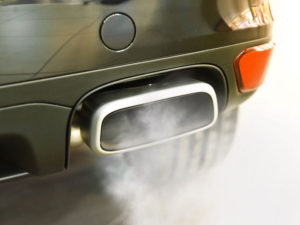Rising new car CO2 prompts carmakers’ call for EV infrastructure investment
Average new car CO2 emissions rose in 2017, putting carmakers further away from their 2021 targets.
The final data from the European Environment Agency (EEA) shows average CO2 emissions from new cars in 2017 were 118.5g/km, up 0.4% compared to 2016, which largely confirms the provisional 2017 figures, published by the EEA in April last year.
Although this level remains below the current target level of 130g/km, it is well above the target of 95g/km to be achieved by 2021. As a result, although almost all car makers met their 2017 CO2 emission targets on new sales, the EEA says overall progress towards the 2021 targets is insufficient.
Amongst the largest automakers, Toyota Motor Europe had the lowest average CO2 emissions for new passenger cars registered in 2017 (with 103g/km). Peugeot and Citroen followed with 105g/km) and 106g/km), respectively.
However, the picture was better for LCVs – which diesel has had to remain the dominant fuel type. Average CO2 emissions of new vans in the EU in 2017 dropped by 7.5g/km from 2016. The average new van registered in 2017 emitted 156.1g/km. This reduction brings the EU average emissions 11 % below the 2017 target of 175g/km and 6 % above the 2020 target. As in every year since vans monitoring commenced, Dacia SA was the lowest-emitting vans manufacturer (118g/km in 2017).
Commenting on the rise in new car CO2 for 2017, the EEA said the increase – which marks the first rise since 2010, when monitoring started under current EU legislation – is stark confirmation that car makers need to achieve further and faster improvements in manufacturing and promoting more efficient cars.
The figures also show the results of anti-diesel policies by national governments and towns/cities in Europe that have led to drivers switching to petrols.
New car data shows that for the first year since 2009, petrol cars constituted the majority of new registrations in 2017 (almost 53%). The proportion of electric vehicles (plug-in hybrid and battery electric cars) increased from 1.0 % in 2016 to 1.5 % in 2017.
This increase in registrations has taken its toll in terms of emissions. New diesel cars, which were on average around 300kg heavier than new petrol cars, emitted on average 117.9g/km, which is 3.7g/km less than the average petrol car.
If similar petrol and diesel segments are compared, new conventional petrol cars emitted 10-40 % more than new conventional diesel cars.
“It is no coincidence that 2017 marked the first increase in CO2 from cars since records began in 2010, as it was also the first year that petrol overtook diesel in terms of new car sales,” stated Erik Jonnaert, secretary general of the European Automobile Manufacturers’ Association (ACEA).
Jonnaert added: “Given that sales of diesel cars continued their decline in 2018, all indications unfortunately point to CO2 emissions increasing for a second year running in 2018.”
The ACEA also renewed its calls for increased investment in EV infrastructure to help encourage more drivers to switch to EVs as it highlighted that meeting the 2021 CO2 targets will require a much stronger uptake of alternatively powered cars.
“All auto manufacturers continue to invest strongly in their portfolios of alternatively-powered cars, most notably electric ones,” Jonnaert explained. “However, the reality is that consumers are not rushing to buy these vehicles in large numbers.”
He added that there are currently some 150,000 public charging points for electric cars available in the EU. At least 2.8 million will be needed by 2030, according to conservative estimates by the European Commission. That translates to almost a 20-fold increase within the next 12 years.
Jonnaert finished: “We urge national governments and EU policy makers to make the much-needed infrastructure investments so that sales of electrically chargeable cars can really take off in Europe.”













